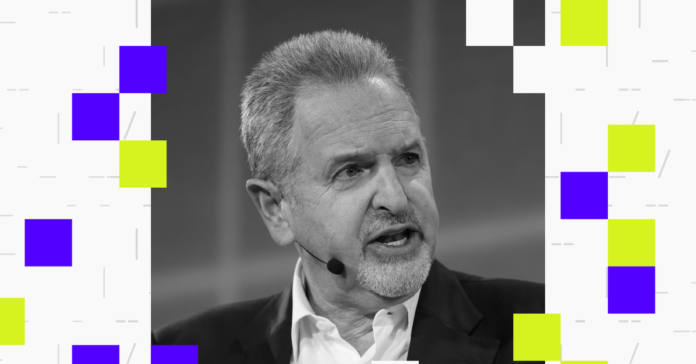Arm CEO Rene Haas has a unique, bird’s eye view of the tech industry. His company’s chip designs are in the majority of devices you use on a daily basis, from your smartphone to your car. The SoftBank-backed company he leads is worth almost $150 billion, which is now considerably more than Intel.
With the news earlier this week that Intel CEO Pat Gelsinger “retired” and Intel is evaluating its options for a possible spinoff or outright sale, I wanted to hear what Haas thought should happen to his longtime frenemy. There were reports that he approached Intel about buying a big chunk of the company before Gelsinger was ousted. At the same time, Arm is also rumored to be eyeing an expansion into building its own chips and not just licensing its designs.
Haas and I touched on all that and more in an exclusive interview earlier today, which will air in full on a future episode of Decoder. (You can listen to my episode about AI spending in the enterprise that just came out as well.) In the meantime, I wanted to give subscribers the first peek at the highlights from my conversation with Haas.
The following interview has been edited and condensed:
On what he makes of the Intel situation:
As someone who has been in the industry my whole career, it is a little sad to see what’s happening… Intel is an innovation powerhouse. At the same time, you have to innovate in our industry. There are lots of tombstones of great tech companies that don’t reinvent themselves.
I think Intel’s biggest dilemma is how to disassociate being either a vertical company or a fabless company, to oversimplify it. That is the fork in the road that they’ve faced for the last decade. Pat [Gelsinger] had a strategy that was very clear that vertical was the way to win. In my opinion, when he took that strategy on in 2021, that was not a three-year strategy. That was a five-to-10-year strategy. He’s gone and there’s a new CEO to be brought in and the decision has to be made.
My personal bias says that vertical integration is a pretty powerful thing. If they could get that right, I think they would be in an amazing position. But the cost associated with it is so high that it may be too big of a hill to climb.
I’m not going to comment on the rumors that we wanted to buy them. But I think, again, if you’re a vertically integrated company and the power of your strategy is in the fact that you have a product and you have fabs, inherently, you have a potential huge advantage in terms of cost versus the competition. When Pat was the CEO, I did tell him more than once, “You ought to license Arm because if you’ve got your own fabs, fabs are all about volume and we can provide volume.” I wasn’t successful in convincing him to do that.
On the rumors that Arm will build its own AI chips:
If you’re defining a computer architecture and you’re building the future of computing, one of the things you need to be very mindful of is that link between hardware and software in terms of really understanding where the tradeoffs are being made, where the observations are being made, what are the ultimate benefits to consumers from a chip that has that type of integration.
That is easier to do if you’re building something than if you’re licensing IP… If you’re building something, you’re much closer to that interlock, and you have a much better perspective in terms of the design tradeoffs to make. So, if we were to do something, that would be one of the reasons.
On Arm’s ongoing lawsuit with Qualcomm:
The current update is that it plans to go to trial on December 16th, which isn’t very far away. I can appreciate — because we talk to investors and partners — that what they hate the most is uncertainty. But on the flip side, I would say the principles as to why we filed the claim are unchanged.
On Sam Altman’s prediction that AGI will arrive in 2025:
I know he has his own definitions for AGI and his reasons for those definitions. I don’t subscribe so much to what is AGI versus ASI [artificial superintelligence]. I think more around when these AI agents start to think and reason and invent. To me, that is a bit of a “cross the Rubicon” moment… If you would have asked me this question a year ago, I would have said it’s quite a ways away. You ask that question now, [and] I say it is much closer.
On David Sacks being named President-elect Donald Trump’s AI and crypto czar:
Kudos to him. I think that’s a pretty good thing. It’s quite fascinating that if you go back eight years to Trump 1.0, in terms of where we were in December as he was starting to fill out his Cabinet choices and appointees, it was a bit chaotic. At the same time, there wasn’t a lot of representation from the tech world.
This time around, whether it’s Elon [Musk], whether it’s David [Sacks], whether it’s Vivek [Ramaswamy] — I know Larry Ellison has been very, very involved in terms of discussions with the administration — I think it’s a good thing. Having a seat at the table and having access to policy, I think, is really good.
Samsung’s shake-up
Big leadership changes hit Samsung Electronics this week, per an internal memo I’ve obtained. North America CEO KS Choi is out and has been replaced by Yoonie Joung, a 33-year company veteran. Dave Das now solely oversees the mobile business while former co-head Brent Yoo is heading to Brazil




